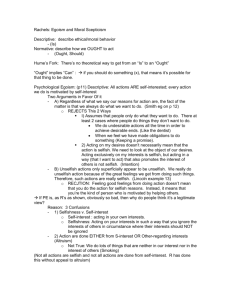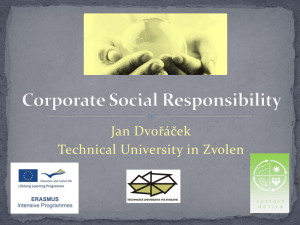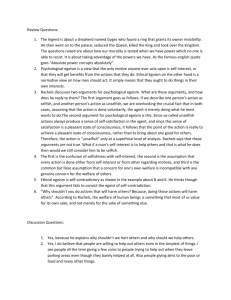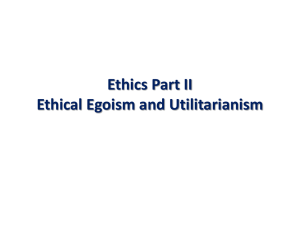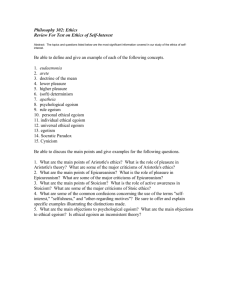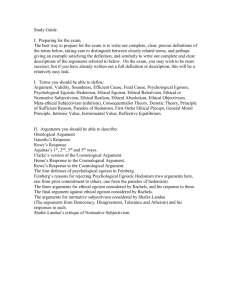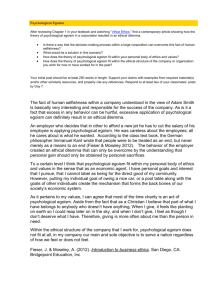Ethical Egoism For those unfamiliar with the concept of Egoism, I will
advertisement
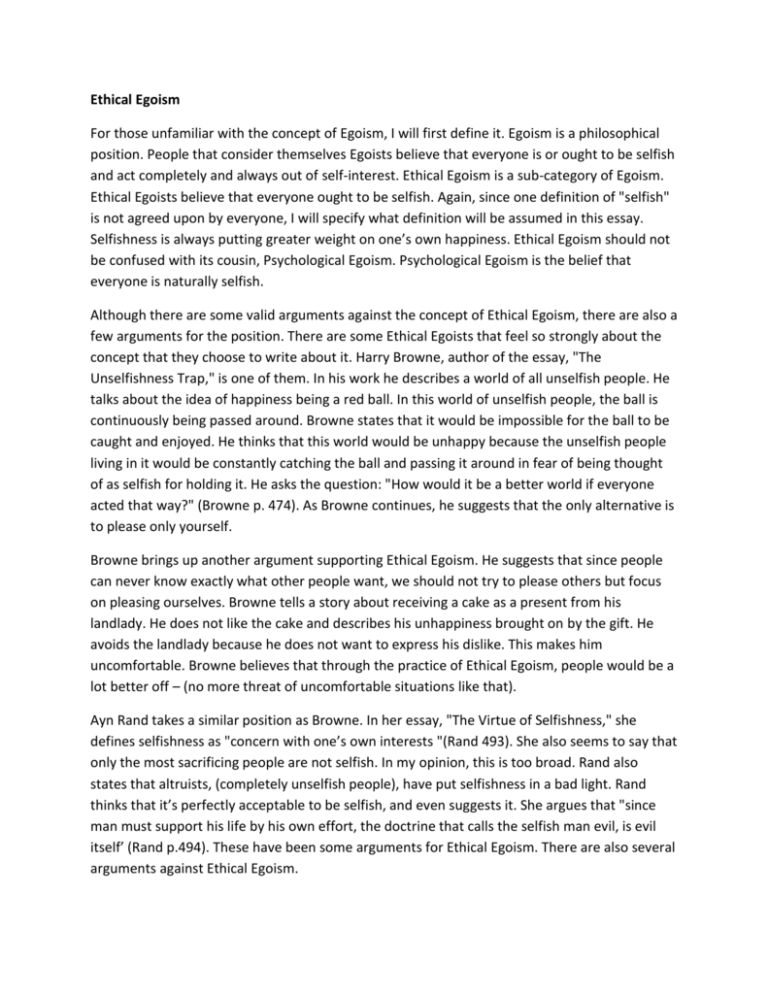
Ethical Egoism For those unfamiliar with the concept of Egoism, I will first define it. Egoism is a philosophical position. People that consider themselves Egoists believe that everyone is or ought to be selfish and act completely and always out of self-interest. Ethical Egoism is a sub-category of Egoism. Ethical Egoists believe that everyone ought to be selfish. Again, since one definition of "selfish" is not agreed upon by everyone, I will specify what definition will be assumed in this essay. Selfishness is always putting greater weight on one’s own happiness. Ethical Egoism should not be confused with its cousin, Psychological Egoism. Psychological Egoism is the belief that everyone is naturally selfish. Although there are some valid arguments against the concept of Ethical Egoism, there are also a few arguments for the position. There are some Ethical Egoists that feel so strongly about the concept that they choose to write about it. Harry Browne, author of the essay, "The Unselfishness Trap," is one of them. In his work he describes a world of all unselfish people. He talks about the idea of happiness being a red ball. In this world of unselfish people, the ball is continuously being passed around. Browne states that it would be impossible for the ball to be caught and enjoyed. He thinks that this world would be unhappy because the unselfish people living in it would be constantly catching the ball and passing it around in fear of being thought of as selfish for holding it. He asks the question: "How would it be a better world if everyone acted that way?" (Browne p. 474). As Browne continues, he suggests that the only alternative is to please only yourself. Browne brings up another argument supporting Ethical Egoism. He suggests that since people can never know exactly what other people want, we should not try to please others but focus on pleasing ourselves. Browne tells a story about receiving a cake as a present from his landlady. He does not like the cake and describes his unhappiness brought on by the gift. He avoids the landlady because he does not want to express his dislike. This makes him uncomfortable. Browne believes that through the practice of Ethical Egoism, people would be a lot better off – (no more threat of uncomfortable situations like that). Ayn Rand takes a similar position as Browne. In her essay, "The Virtue of Selfishness," she defines selfishness as "concern with one’s own interests "(Rand 493). She also seems to say that only the most sacrificing people are not selfish. In my opinion, this is too broad. Rand also states that altruists, (completely unselfish people), have put selfishness in a bad light. Rand thinks that it’s perfectly acceptable to be selfish, and even suggests it. She argues that "since man must support his life by his own effort, the doctrine that calls the selfish man evil, is evil itself’ (Rand p.494). These have been some arguments for Ethical Egoism. There are also several arguments against Ethical Egoism. Ethical Egoism is not agreed upon by everyone. Rachels states that it is not technically possible for a person to be a true Ethical Egoist. The definition of an Ethical Egoist is someone who thinks that everyone should act selfishly all the time. Rachels seems to believe that this in itself is a somewhat unselfish statement. A true Ethical Egoist would not want the whole world to be selfish, (and therefore happy in his eyes.) In this case, there would be no one to make the Ethical Egoist happy. Rachels says "a true Ethical Egoist would encourage others to act benevolently instead of selfishly, for his/her sake" (Rachels, p. 487). Another point that Rachels makes is one about miscommunication Rachels thinks that Ethical Egoists are mixing up the definitions of selfish and self-interest. For instance, Ayn Rand defines selfishness as concern with one’s own interest (Rand p. 493). Rachels seems to imply that selfishness is often a negative thing and self-interest is usually not only positive, but necessary. For instance, going to a doctor when sick, brushing one’s teeth, or eating a meal is of one’s selfinterest, but doing these things do not make the person selfish. Louis Pojman, author of "Egoism, self-interest, and Altruism," directly criticizes Ayn Rand’s view on Ethical Egoism. Pojrnan thinks that Rand assumes a false dilemma. He claims that just because it does not seem right to be altruistic, does not mean that the only option is to be completely selfish. He says "there are plenty of options between these two positions" (Pojman, p. 498). He brings up the Bible’s idea of loving your neighbor as yourself. He also says that selflove is good, but not always at the expense of others (Pojman p.498). In a story told by Pojman about three personality types, (selfish, unselfish, and in the middle), the moderate personality type seems to be most reasonable. Sources: http://www.siu.edu/~philos/faculty/Manfredi/intro/ethics/egoism.html ttp://www.lapraik.com/cordeaux/Teachers%20Resources/EthicalEgoism.doc http://www.angelfire.com/ri/tucker/relativism/morality26.html Questions on Ethical Egoism 1. What is the difference between ethical egoism and psychological egoism? 2. What are Browne’s two points in favour of ethical egoism? 3. What does author Ayn Rand say in her book, The Virtue of Selfishness? 4. What is one criticism against the definition of a true ethical egoist? 5. Why does Pojman think Ayn Rand’s position is a false dilemma 6. What is your position on ethical egoism?
